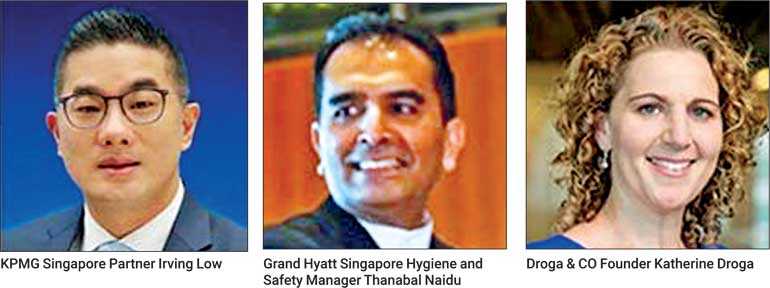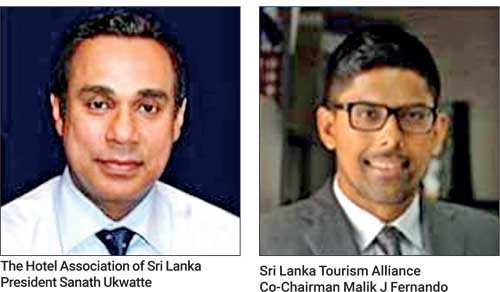Wednesday Feb 25, 2026
Wednesday Feb 25, 2026
Wednesday, 10 June 2020 00:34 - - {{hitsCtrl.values.hits}}

By Medha de Alwis
The Sri Lanka Tourism Alliance Resilience recently held a useful webinar on ‘How to prepare your business to reopen: Insights from Singapore’, diving into how Asia’s popular city state took its learnings from the SARS epidemic. 
A specific initiative was to create Singapore Clean – an innovation and certified program for the hospitality and tourism sector that ensures businesses operate with superior clean protocols during this time.
The speakers were Irving Low, Thanabal Naidu, Margaret Heng and Sanath Ukwatte.
Irving Low is a partner of KPMG Singapore who shared how the program works and the application for the Sri Lanka tourism industry. KPMG was the consultancy firm engaged by the Singapore Tourist Board to co-create and implement the Singapore Clean campaign.
Thanabal Naidu is the hygiene and safety manager at Grand Hyatt Singapore, one of the first hotels to be certified by Singapore Clean in Singapore. Margaret Heng is the Executive Director of the Hotel Association Singapore and Sanath Ukwatte is the President of The Hotels Association of Sri Lanka. The session was introduced by Co-Chair Sri Lanka Tourism Alliance Malik J. Fernando and was moderated by Global Tourism Expert Katherine Droga, Founder Droga & Co. and Advisor to the Alliance.
Fernando said The Sri Lanka Tourism Alliance came into effect a week after the Easter Sunday attack with the focus of letting the world know that Sri Lanka is open and safe for tourist arrivals. It has a membership of 500 tourist business and remains a free membership entity that concentrates on sustainable tourism with an emphasis on growth benefitting all segments. In addition to the queries by the moderator, the web audience too was given the opportunity to pose online questions from the panel. The webinar looked at when and how can tourism re-open for foreign guests and the public. The emphasis was first open for local traveller, gain confidence and trust and then extend the reach to international travellers as borders re-open.
In that context of COVID-19 the experts dealt with the issue of global best health and safety practices and specific guidelines as well as those followed in Sri Lanka and recommended by the Sri Lanka Tourism Development Authority.
Singapore Clean project
Low said during COVID-19 pandemic Singapore believed in keeping the economy open. People were encouraged to go out adopting safety measures so that the economy would not be greatly penalised. KPMG was assigned with the role of certification as an independent trust. KPMG would audit the hotel on its safety, hygiene and preventive measures and award certification. The period that it takes for certification is around a week. Ninety hotels have been certified so far. The next batch of certification beginning from 1 June. Singapore Clean project has been welcomed by the Singapore tourist sector and the feedback has been excellent, he added.
“This is a process of certification with a series of checks, but not a means of penalising the hotels. The motive is to assist the hotels to maintain minimum standards of sanitation, hygiene and prevention as well as how to handle a COVID-19 case if it occurs,” Low explained. “Singapore Clean is a self-assessment process, with the additional benefit that if safety measures are adhered to at work, they could easily be habitual in being adhered to at home too. Also it is a way of being socially responsible to beat the pandemic,” he added.
Best practices of Grand Hyatt in Singapore
Naidu shared the experience of the Grand Hyatt in Singapore. “All staff are involved in the cleaning program. It is team work. The main checks are: Temperature check of the guest at the time of arrival; Hand sanitisation; Travel declaration; Measure for personal hygiene being adopted such as washing hands every half an hour; and Constant disinfection of the main public areas including toilets,” he said.
The hotel is divided into three segments for the process of cleaning and priority for cleaning are accorded accordingly. These divisions are: Rooms, Food and beverage and Retail.
Cleaning takes place almost every hour at general places and every half an hour in the high risk areas. Touch points such as door knobs and handles are specially cleaned. Hand sanitation is important in all areas and mostly in the food and beverage section. Regular swab tests are done as an extra precautionary measure.
Additionally, pools and spas are presently closed and would be for some time. Once reopened a new set of guidelines as follows should strictly be enforced: A limited number of people will be allowed in; Increase the chlorine percentage to kill bacteria; Pool tests; and Ascertain that no one looking sick enters these premises.
While focusing on hand hygiene, one tends to neglect pest control. Likewise hotels have to make sure that all segments of a hotel are well protected and looked after.
In terms of whether the staff increased due to the cleaning protocol, Naidu said it wasn’t. “Staff were compartmentalised into three teams for the purpose of cleaning. If one member of a team gets infected the whole teams needs to be quarantined. It is for this purpose that 3 teams are made. Some department whose duty was not cleaning prior to COVID-19 was cross-trained to clean. That way they got the advantage of acquiring a new skill too,” he explained.
With regard to safety measures for the guests, the webinar was told that the hotels sector do not have guests at the moment. When guests start coming in, it will be mandatory to adopt social distancing even at instances such as dining and entertainment. Scale and complexity of the tourism industry is diverse. There are 7,000 tourist places in Singapore and it is important to make sure that all these locations comply with the minimum standards of sanitisation, hygiene and prevention.
Industry challenges
Experts also stressed the importance of the tourist sector in Sri Lanka adopting proper safety protocols for the eventual re-opening.
“The future of the business will depend on the confidence the patron would gain depending on the safety measures. The guests would patronise a hotel only if they feel safe. Creating a COVID-19 task force is essential by mobilising staff with stringent hygiene protocols. All steps have to be taken in lowering points of guest contact. Social distance should be maintained at the beaches. Placing of the beach lounges for example; have to be thought about afresh,” the experts emphasised.
In terms of main challenges of implementing a safety protocol, it was explained that the foremost was fear. “Fear to change. This is an experience of a life time and it takes time to absorb. One should adopt the attitude of being ready to unlearn the learning and relearn. These challenges could be met with proper training on personal hygiene and leadership,” the experts emphasised.
The industry has to stop waiting for the pandemic to end and understand that it is here to stay; at least for some time, which might be longer than expected. One needs implement all precautions and be complacent in living and working with it.
It was also pointed out that there will be many challenges faced by the small and medium scale tourist industries.
“The cost and work load goes high with the safety protocol, and for an industry that is presently struggling to pay wages, this certainly is a daunting task. This case would definitely be worse for the small and medium scale establishments. But it is a solace that this effort would pay dividends in the long run. For the moment it is mandatory to bite the bullet for a better future,” they pointed out.
Role of Government
The webinar also focused on the role of the government. Sharing best practices, the Singapore-based experts said the Singapore Government has fully funded the Singapore Clean project.
“No tourist hotel incurs any cost at the moment. This is the plan for one year, and after that one is hopeful of tourism picking up in the post COVID-19 period. In Singapore government buys some hotels for a certain period and effects isolation and quarantine facilities in these. In any country, unless the government steps in to support the tourist sector which could be one of the most affected industries due to COVID-19, tourism could be hard to revive,” they stressed.
QR code for every tourist
Singapore has proposed a QR code for every traveller. The said code would comprise of details such as name and contact information so that tracking and tracing is easy as it would map up the foot print. This is a wise to be implemented upon not only the tourist but every citizen also.
The experts also recommended online and digital training to be cost effective. KPMG proposed a video which can be referred to anytime, unlike a one off training that has no trace later. Sri Lanka Tourist Development Authority could introduce a one year free registration to all stakeholders in the industry so that the government can keep a tab on the informal segments. One could think of introducing ISO 2000 standard for these hygiene measure. But it is important to know that there are no standards to COVID-19. Even Singapore Clean is not a COVID-19 free assurance. The safe one can be, the better it would be.